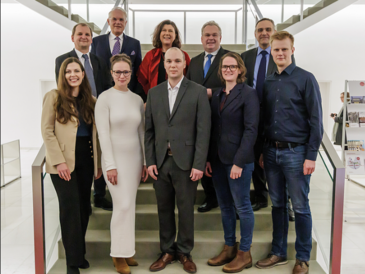The Bremen Thesis Award is presented by the “unifreunde” Association of the Friends of the University of Bremen and Constructor University and honors outstanding dissertations, master's theses, and state examination theses. In addition, the company Bruker Daltonics GmbH & Co KG donates a special prize for a dissertation in the field of natural sciences and engineering at the University of Bremen. The prize for a master's or state examination thesis is endowed with 500 euros, the prize for a dissertation with 1,000 euros.
Maylin Homfeldt receives the prize for her Master's thesis in the Department of Production Engineering at the University of Bremen. In her thesis, she dealt with an innovative method for detecting quality defects at an early stage, counteracting them and avoiding them in the future. In her examination of the additive process of binder jetting, she worked with the contact image sensor unit (CIS) of a commercially available document scanner. This enabled her to generate images of the metal powder bed with the binder applied and evaluate them using an algorithm. In this way, she was able to compare the actual binder insertion with the target binder insertion and identify geometric deviations. Maylin Homfeldt is an alumni of the interdisciplinary course “Process-oriented Materials Research” (ProMat), which was initiated by the MAPEX Center for Materials and Processes. Her thesis was written at the Fraunhofer IFAM. Currently she works at the Leibniz-Intitute for Material-Oriented Technologies (IWT) in the Lightweight Materials department
Dr. Isabell Grothaus receives the special prize from Bruker Daltonics GmbH & Co.KG. for her dissertation. In her work, she opens up new insights into the world of sugar. She has developed new methods to analyze the three-dimensional structure of sugars called N-glycans and to study their flexibility, which is crucial for their function. Sugar is not only a source of energy, but also plays a central role in the human body. It forms a kind of 'sugar glaze' on cell surfaces, which is crucial for cell communication and protection against diseases. Changes in this sugar layer, for example due to tumors or parasites, can promote serious illnesses. Grothaus' methods could be used in the fight against sleeping sickness, a tropical disease caused by the parasite “Trypanosoma congolense”. The parasite manipulates the sugar layer of the red blood cells in the human body, which leads to severe symptoms of the disease. Grothaus was able to show that the flexibility of sugar structures influences the activity of a specific enzyme of the parasite. Specific interventions in these structures could lead to the development of a new therapy in the future. These findings could also be used for the development of medication against cancer or other diseases, as they help to understand the complex interactions between sugar and enzymes in detail. The discovery marks an important step towards deciphering the 'sugar code', which is crucial for many biological processes. Grothaus' dissertation entitled “Conformational phase spaces of N-glycans under the computational microscope” was written in the Hybrid Materials Interfaces Group at the University of Bremen.
In welcoming speeches in the Bremen State Parliament ceremonial hall, Irene Strebl, State Councilor for the Environment, Climate, and Science, Professor Michal Kucera, Vice President for Research and Transfer, and Dr. Georg Mecke, Chairman of the unifreunde Association, praised the achievements of the eight laureates.
Michal Kucera called for the celebration of academic freedom: “Academic freedom is the basis for supporting researchers. We need early-career academics who are empowered and encouraged to develop freely, set their own research topics, conduct open-ended research, and critically engage with controversial topics. Only in an environment that allows for imaginative and innovative ideas can they fully develop their potential and become outstanding scientists of the next generation. So tonight, let's take a conscious look at what we are not usually aware of because it is always there. In addition to the outstanding achievements of the laureates, let us also celebrate academic freedom together on this occasion.”
References and more Information


